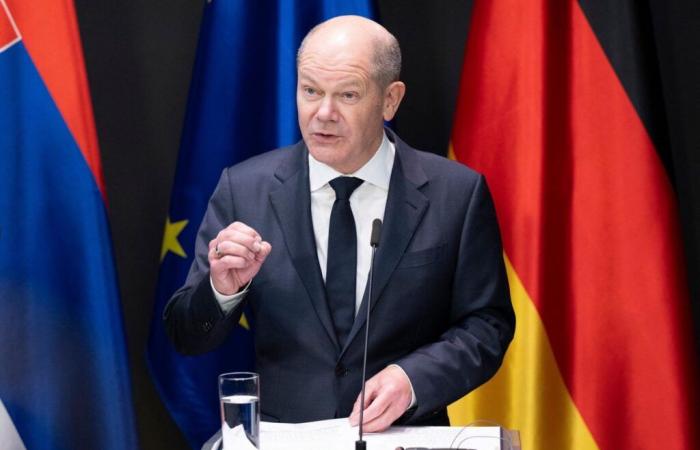Political crisis in Germany –
Olaf Scholz calls for vote of confidence in early elections
Despite unfavorable polls, the German chancellor is preparing for the dissolution of his government and wants a vote in February.
Posted today at 4:01 p.m.
“I would like to pave the way for early federal elections,” declared the Social Democrat.
AFP/Sebastian Kahnert
Subscribe now and enjoy the audio playback feature.
BotTalk
Olaf Scholz kicked off the dissolution of his government on Wednesday with the submission of a request for a vote of confidence leading to a general election in February, plunging Germany into a period of uncertainty.
“I thus wish to pave the way for early federal elections,” declared the German Chancellor in a message on his X account accompanied by a photo showing him signing the request.
MEPs must vote on Monday December 16 from 1:00 p.m. local time.
This planned sabotage on the part of the social democratic leader is part of the serious crisis that Europe’s largest economy, once a model of political stability, is going through, at a time when its privileged partner in the EU, France, is also weakened and in search of a new government.
Dissolve the Bundestag
“If MPs follow the path I am proposing, on Monday afternoon I will propose to President (Frank-Walter) Steinmeier to dissolve the Bundestag. If the Federal President follows my proposal, voters will be able to elect a new Bundestag on February 23 – that is my goal,” he then clarified in a short statement to the press.
“In a democracy, it is the voters who determine the course of future politics,” he said.
Its heterogeneous government coalition with the Greens and the liberals of the FDP, in power since the end of 2021, was shattered on November 6, after the dismissal of the liberal Finance Minister due to differences that had become insurmountable over economic and budgetary policy.
Without the support of his former liberal allies, and the Greens who have not ruled out abstaining, the 66-year-old chancellor would almost certainly lose the confidence of the Bundestag deputies.
Risky bet
Since the post-war period, four chancellors have asked the question of confidence in the Bundestag, often without being forced to do so, and with varying success.
The most recent, the social democrat Gerhard Schröder (1998-2005), had made this risky bet in the hope of advancing the elections which he intended to win. But he ultimately lost to Angela Merkel’s conservatives.
Despite his chronic unpopularity, Olaf Scholz launched into the campaign with the stated desire to win the election. The polls at this stage give him little hope of achieving this.
In opposition, the conservatives of the CDU led by Friedrich Merz, and its Bavarian ally CSU, are clearly the winners, with around 32%% of voting intentions, ahead of the Alternative for Germany (AfD), the far-right party (around 18%)
Olaf Scholz’s SPD is overall at 15%, even if the latest study by the Insa institute shows an increase to 17%.
Future coalition government
In the current state of forces, a future government led by the conservatives, in coalition with the SPD as an ally, constitutes the most likely scenario.
However, OLaf Scholz, a veteran politician who was notably mayor of Hamburg and vice-chancellor with the Finance portfolio in the last Merkel government (2005-2021), has shown several times his ability to defy the odds.
He readily recalls how, in 2021, he won the elections against all odds, certainly taking advantage of the divisions in the conservative ranks but also skillfully posing as the true heir of the conservative chancellor, at the time at the zenith of his popularity.
The man of restraint
This time he also intends to reassure through his experience in a tormented global geopolitical context plunged into the unknown by the election of Donald Trump to the White House.
For several weeks already, he has presented himself as the man of restraint in military support for Ukraine in the hope of capitalizing on the pacifism deeply rooted among the Germans since the Nazi horrors and a significant current of pro-Russian opinion. .
In a Germany threatened with a second recession in a row in 2024, he also wants to encourage business investment in the country and spoke out on Tuesday evening in favor of a reduction in VAT on foodstuffs to support poorest households.
“Latest news”
Want to stay on top of the news? “Tribune de Genève” offers you two meetings per day, directly in your email box. So you don’t miss anything that’s happening in your canton, in Switzerland or around the world.
Other newsletters
Log in
AFP
Did you find an error? Please report it to us.
0 comments






